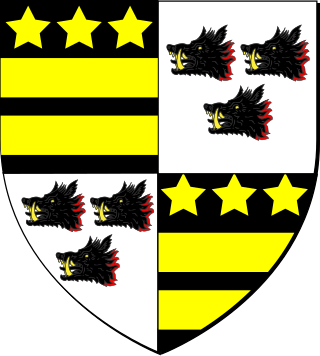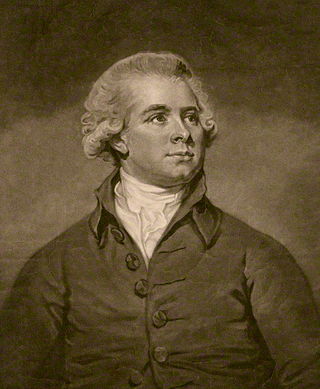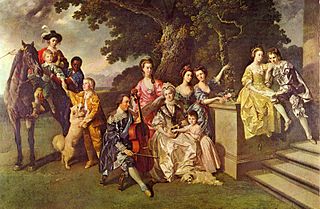
Viscount Cobham is a title in the Peerage of Great Britain that was created in 1718. Owing to its special remainder, the title has passed through several families. Since 1889, it has been held by members of the Lyttelton family.

Earl of Gosford is a title in the Peerage of Ireland. It was created in 1806 for Arthur Acheson, 2nd Viscount Gosford.

Baron Carbery, of Carbery in the County of Cork, is a title in the Peerage of Ireland. It was created in 1715 for George Evans, with remainder to the heirs male of his father and namesake George Evans, a supporter of William and Mary during the Glorious Revolution, who had earlier declined the offer of a peerage. After his elevation to the peerage, Lord Carbery represented Westbury in the House of Commons. He was succeeded by his eldest son, the second Baron. He also sat as Member of Parliament for Westbury. His grandson, the fourth Baron, briefly represented Rutland in Parliament. He was succeeded by his uncle, the fifth Baron. On his death, the line of the eldest son of the first Baron failed. He was succeeded by his first cousin once removed, the sixth Baron, who had previously succeeded his father as second Baronet, of Castle Freke. Lord Carbery sat in the House of Lords as an Irish Representative Peer from 1824 to 1845. His nephew, the eighth Baron, was an Irish Representative Peer from 1891 to 1894. As of 2014 the titles are held by the latter's great-great-grandson, the twelfth Baron, who succeeded his father in 2012.

Baron Henniker, of Stratford-upon-Slaney in the County of Wicklow, is a title in the Peerage of Ireland. It was created in 1800 for Sir John Henniker, 2nd Baronet, who had previously represented Sudbury and Dover in the House of Commons. His son, the second Baron, also sat as a Member of Parliament. In 1792 he assumed by Royal licence the additional surname of Major. He was childless and was succeeded by his nephew, the third Baron. He assumed the additional surname of Major by Royal licence in 1822. His son, the fourth Baron, represented Suffolk East in Parliament. In 1866 he was created Baron Hartismere, of Hartismere in the County of Suffolk, in the Peerage of the United Kingdom. This title gave him and his descendants an automatic seat in the House of Lords. He was succeeded by his son, the fifth Baron. He also sat as Member of Parliament for Suffolk East and later held minor office in the Conservative administrations of Benjamin Disraeli and Lord Salisbury. His grandson, the eighth Baron, was a prominent diplomat and notably served as British Ambassador to Jordan and to Denmark. As of 2014 the titles are held by the latter's son, the ninth Baron, who succeeded in 2004.

Baron Dufferin and Claneboye, of Ballyleidy and Killyleagh in County Down, Northern Ireland, is a title in the Peerage of Ireland. It was created on 30 July 1800 for Dame Dorcas Blackwood, widow of Sir John Blackwood, 2nd Baronet, Member of the Irish Parliament for Killyleagh and Bangor, in return for support for the Union of Ireland and the United Kingdom.

There have been seven baronetcies created for members of the Lowther family, one in the Baronetage of Nova Scotia, two in the Baronetage of England, two in the Baronetage of Great Britain and two in the Baronetage of the United Kingdom. Two of the creations are extant as of 2008.
There have been 18 baronetcies created for persons with the surname Campbell, six in the Baronetage of Nova Scotia and twelve in the Baronetage of the United Kingdom.

There have been eight Baronetcies created for persons with the surname Jones, one in the Baronetage of England, one in the Baronetage of Great Britain and six in the Baronetage of the United Kingdom. Three of the creations are extant as of 2010.

There have been three baronetcies created for members of the Ingilby/Ingleby family, one in the Baronetage of England, one in the Baronetage of Great Britain and one in the Baronetage of the United Kingdom. The latter title is extant while the other two creations are extinct.
The Henniker Baronetcy, of Newton Hall in the County of Essex, was created in the Baronetage of the United Kingdom on 2 November 1813 for Brydges Henniker, who had earlier represented Kildare Borough in the last Irish Parliament. He was the youngest son of John Henniker, 1st Baron Henniker. The sixth baronet was an admiral in the Royal Navy and sat as Conservative member of parliament for Galloway. The eighth Baronet was a brigadier in the Royal Engineers. As of 2014 the present Baronet has not successfully proven his succession and is therefore not on the Official Roll of the Baronetage, with the baronetcy considered dormant since 2000.

There have been five baronetcies created for persons with the surname Young, one in the Baronetage of England, one in the Baronetage of Great Britain and three in the Baronetage of the United Kingdom. As of 2014, four of the creations are extant.
The Harford Baronetcy, of Falcondale in the County of Cardigan, is a title in the Baronetage of the United Kingdom. It was created on 29 June 1934 for Major John Charles Harford.
There have been nine baronetcies created for persons with the surname Moore, two in the Baronetage of England, one in the Baronetage of Ireland, two in the Baronetage of Great Britain and four in the Baronetage of the United Kingdom. As of 2014 two creations are extant and one is considered dormant.

There have been eight baronetcies created for persons with the surname Wilson, one in the Baronetage of Ireland and six in the Baronetage of the United Kingdom.
The Miles Baronetcy, of Leigh Court in the County of Somerset, is a title in the Baronetage of the United Kingdom. It was created on 19 April 1859 for the banker and Conservative politician William Miles. His son, the second Baronet, was also a banker and Conservative politician. The family's bank, founded in 1750, eventually became part of NatWest.
There have been six baronetcies created for persons with the surname King, one in the Baronetage of Ireland, one in the Baronetage of Great Britain and four in the Baronetage of the United Kingdom. Three of the creations are extant as of 2007.
There have been three baronetcies created for persons with the surname Hewett, one in the Baronetage of England and two in the Baronetage of the United Kingdom.

Sir Harford Jones-Brydges, 1st Baronet, DL, born Harford Jones, was a British diplomat and author.

The Brydges, later Egerton-Barrett-Brydges Baronetcy, of Denton Court in the County of Kent, was a title in the Baronetage of the United Kingdom. It was created on 27 May 1815 for the bibliographer, genealogist and politician Samuel Egerton Brydges. He claimed the barony of Chandos, initially on behalf of his older brother Reverend Edward Tymewell Brydges and then on his own behalf. The House of Lords rejected the claim in 1803, but Brydges nevertheless continued to style himself per legem terraeBaron Chandos of Sudeley. He was succeeded by his son, John, the second Baronet, who assumed the additional surname of Egerton and Barrett. The title became extinct on the latter's death in 1863.
There have been two baronetcies created for persons with the surname Brydges, one in the Baronetage of England and one in the Baronetage of the United Kingdom. Both creations are extinct.













